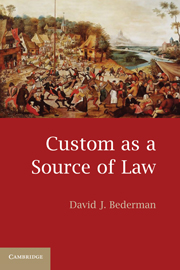3 - History
The Common Law and Custom
Published online by Cambridge University Press: 05 June 2012
Summary
If custom was largely perceived as a cultural phenomenon for medieval Continental jurists, it took on a decidedly historical cast in England. This would have a profound effect on attitudes towards custom in the Anglo-American common-law tradition, particularly with the normative hierarchy of custom in relation to other law sources, the requisite proofs of custom, and other restraints on evolving customary norms. In England, these transformations in the roles of custom took place over three broad periods. In what I refer to here as the “pre-Blackstonian epoch,” two distinctive ideas of customary law emerged from the ius commune (considered in the last chapter). One of these was the idea that the judge-made common law was itself a customary regime. The other was the continuation of a more traditional notion of local or special systems of legal practices being recognized in derogation of the common law.
These two strands of English legal thought were woven together in the writings of Coke, Selden, and Hale as part of the English constitutional struggles of the sixteenth and seventeenth centuries, but were only finally fully synthesized and digested in William Blackstone’s Commentaries on the Laws of England (1765). Blackstone’s work was immensely influential for what would follow in British jurisprudence, but also for developments in the United States and other common-law jurisdictions, and the full scope of his doctrine is recounted at length here. Post-Blackstonian intellectual currents – particularly Jeremy Bentham’s writing, but also late-nineteenth- and early-twentieth-century debates in U.S. legal circles – will also be considered in order to give a full tour d’horizon of the common-law tradition’s historic engagement with the role of custom in law.
Information
- Type
- Chapter
- Information
- Custom as a Source of Law , pp. 27 - 41Publisher: Cambridge University PressPrint publication year: 2010
